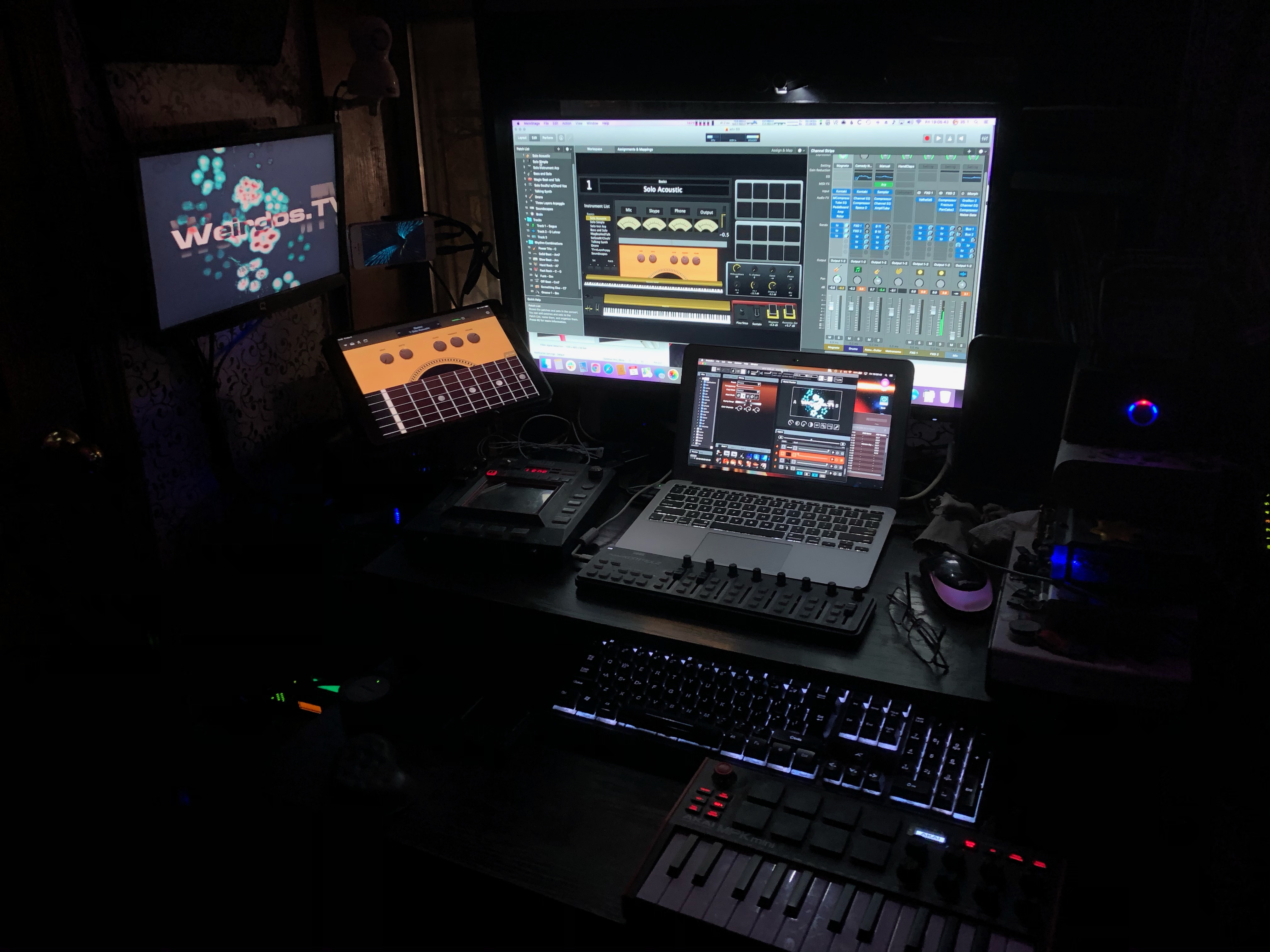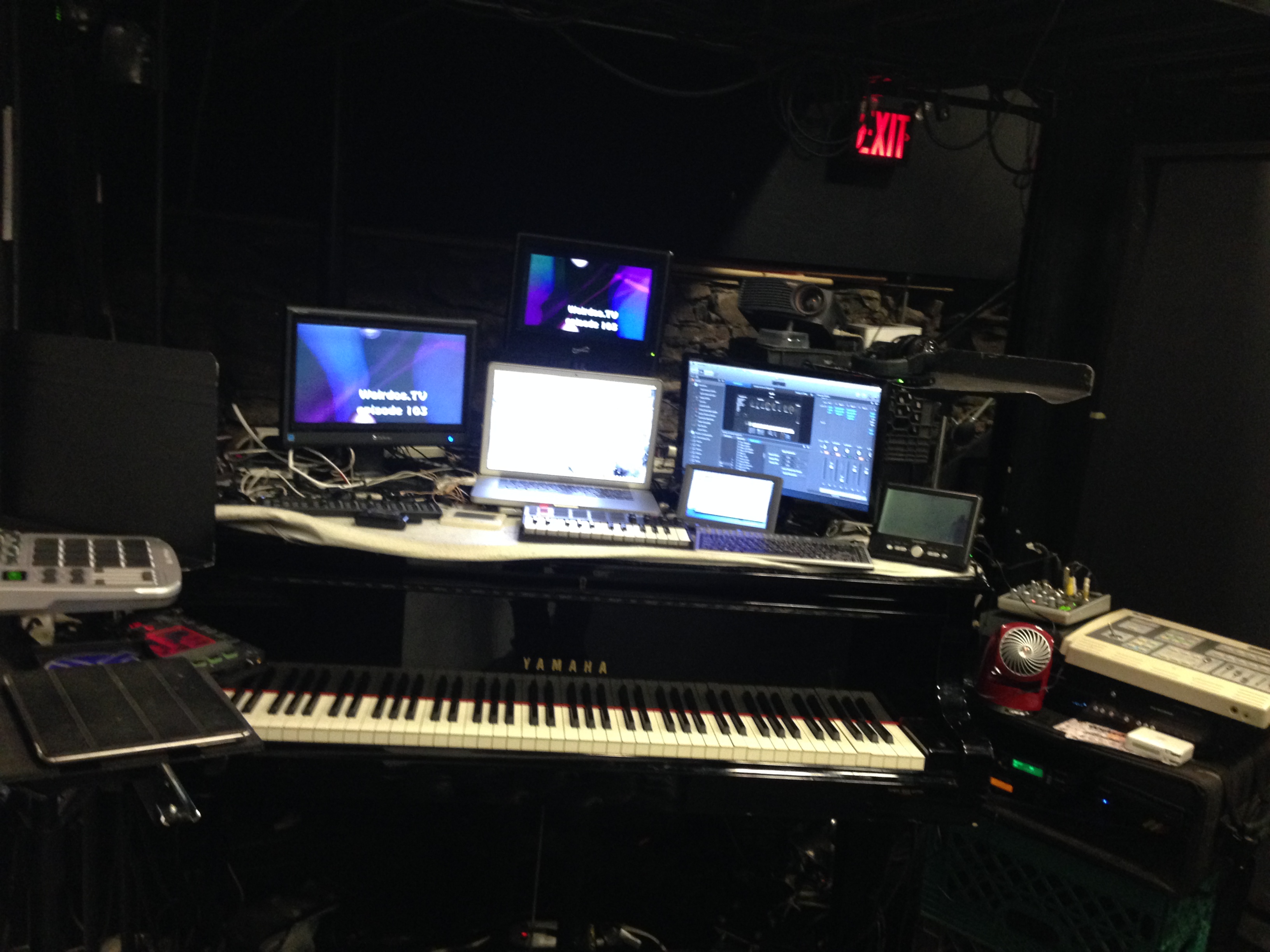- Improvisation
I've studied improvisation for the theatre, for music and for dance, and have attempted to combine the techniques and aesthetics I like best from each.
In studying the theatre improvisation techniques of Viola Spolin and Keith Johnstone, I learned about ways to be open to finding the next moment and keeping the stream of creativity going.
I was taught jazz improvisation as a young music student, and quickly became interested in composition and musical structures. Working with Verge, we developed our own ways of inventing musical pieces live (and generally recorded everything and listened back to it obsessively), and once had an event where we improvised for 24 hours in front of an audience.
I studied post modern dance at NYU's Experimental Theatre Wing with innovative artists like Anne Bogart, Kevin Kuhlke, Mary Overlie, Paul Langland, Nina Martin and Wendell Beavers. I got to spend many hours improvising with many talented people, and occasionally even got to contribute live improvised music to the movement, which was an early thrill and a clue for me.
With Verge, we developed our own approach to creating musical improvisations. From Zappa I stole the idea of using special hand gestures to get the band to do things on cue. And at least some of the improvisational techniques we used came form the work of Keith Johnstone (which had been recommended to me by Eugenio Barba).
Eventually I was able to work some of the movement and theatrical improvisation concepts into Verge shows, and I always wanted to balance them all together in some way.
With Verge we generally played improvisational jams in between carefully rehearsed musical numbers (other than the improv only show mentioned above). I always loved the jams best of all, and we often spent hours listening back to the improvs and relishing the happy accidents they contained.
- Mixing
- Live processing

The current set-up
The live set-up in 2013Technically, the set-up requires four computers. One for video, one for audio, one for the Skype guest and one for the broadcast (recently the Skype computer was replaced with an iPhone). The audio is routed to the other computers (requiring special mixing so that the phone calls and Skype calls are not sent back those inputs. The video from the live camera and the Skype source are processed on top of stock footage and both audio and video are routed to the broadcast computer as well as two recording devices.
The audio runs in Apple's MainStage application, with a series of setups that mimic the type of arrangements I used to create with my band Verge. Part of the joy for me is that same feeling of getting a bunch of musicians to improvise to invent interesting textures and jam unpredictable grooves.
The set-up is my instrument, manipulating the video and audio. I push it to its limits, and it breaks pretty much in every episode. The audio isn't properly mixed most of the time, and the video processing program gets clogged up because I push it past what it can handle. While I do work to improve these things, I also always accept whatever comes out (though I do occasionally cut things out).
- Ken Nordine
I would hope that Ken's influence on my work would be more than obvious. His imaginative approach to art creation is at once based on a strong jazz and avant Garde tradition, and totally novel. He is also controlling his own audio engineering, editing and mixing, which is perhaps where I feel I learned the most from him.
When I called him in Chicago in 1980, he was puzzled when I told him I had learned so much from him. "I don't know what you could have learned from me," he said in that unforgettable voice. But it was the freedom to mix and control multiple layers of audio that I was really referring to.
- Frank Zappa
My obsession with Frank knows no bounds, but his main influence on Weirdos.TV I think is encapsulated in his comparison in The Real Frank Zappa book of a piece of music with a recipe for making food. This dovetailed nicely with what I had learned from the equally open minded Anne Bogart. To be able to break any piece of Art down into its constituent elements is to complete Marcel Duchamp's exploration of the boundaries of where life and art meet.
And Mr. Zappa also helped me understand how strongly I believed in "weird for weird's sake", though I can't say he felt that way. But his celebration of freaks and oddness is one of the things I connect with most in his endlessly fascinating creations.
Also, I instantly adopted his "Conceptual Continuity" approach to his full body of work, and continue to relish in referencing bits and vocabulary from all throughout my life and art.
- Brian Eno
- Butthole Surfers
Of course the Buttholes' music had a huge influence on me as it did for many others, and I even got to share a stage with Gibby for a really fun jam.
And Gibby's ability to spew nonsense in a pleasing and psychedelic way is something I strive for in the language portions of Weirdos.TV.
But more than that, the way the Butthole Surfers used movies behind their live shows stuck with me, and I wish more bands would use that style of overlapping stock footage. Later in their career they moved on to visual effects that were very cool, but I always wanted them to go back to the multiple film screens. There were usually two showing various old films of surgery and car wrecks, with a wide film of a nuclear explosion running backwards and in slow motion over both of the other screens.
- Pink Floyd
- Dada
The intention of the show is to be a form of "automatic writing". While I can't say I've received any formal training in that concept, my definition is that it should come unfiltered from the imagination.
I believe I've gotten good at staying true to my stream of consciousness, though I take it a step further towards nonsense by actively diverting my train of thought, as well as leaving out proper names and topical references.
Which brings me to
- Samuel Beckett
I've performed in a fair amount of Beckett's works, and love really everything about it.
What particularly applies to Weirdos.TV I think is his use of language in a vague way to purposefully add meaning(s).
- Non-conformity
- Music
- Psychedelia
- Machines
- Space
- Time
- Alternate dimensions and universes
and is:
I always feel satisfied when I review the material (which I do often just for fun).
I'm fascinated by many artists' paths, but currently I often wonder why everyone doesn't just do some form of what I've done.
I recognize of course it's improvisational nature requires low standards in terms of polished quality
But I've made "finished" art, fully refined and remastered, and since I didn't make any money at it that way, I thought "why not just do the parts I enjoy (creating and recording)? If I happen to make money off of that, it'd be awesome, but in the meantime I've enjoyed every moment of it."
And it is in fact exactly what I would like to see more of. If someone showed me something like Weirdos.TV I'd watch the shit out of it. The closest things I've seen were on Adult Swim, and of course I pitched to them in season 4.
While the appeal appears to be very limited, I suspect there are more fans out there than I'll ever know. I have had at least three people recently tell me about their favorite segments or episodes. And when I look over the endless phone and many Skype calls I've received on the Weirdos line over the years, the response is truly staggering.
And part of that is due to the Internet, which has always been part of the point. Just by being out there in the right place to be discovered, my work can connect with people forever, and I leave it out there ready for people to get lost in.
So if nothing else, I am doing it for myself (which is what Grotowski and all the mentors and idols I've consulted on the subject have urged me to do).
Grotowski pointed out that the word "amateur" has its root in the Latin for "love", meaning one who does it for love - as opposed to doing it for money. He pictured amateurs as superior to "professionals" because they did it in spite of the lack of any monetary rewards.
Growtowski also influenced me with in his Paratheatrics, where he questioned the need for an audience altogether.
What is weird and weirdness? How do you know when someone is a weirdo?
I maintain that it goes beyond just being outside of the cultural norms of that moment in time. I believe there is quality of weirdness that continues to feel "weird" even after it becomes acceptable to mainstream culture. I generally use the example of Stravinsky's Rite of Spring or The Beatles' Revolution No. 9.
And how about the use of the word "space?" Space music and spacing out, these are part of the stoner culture and allow for the imagination to roam, and they also refer to outer space, where things we can barely imagine await. This interests me.
An electronic musician I know once described how he wanted his music to be able to be enjoyed by people who *weren't* stoned, and while I certainly understood why he wanted that, I do not.
I've always been very interested in how drugs and Art intermingle. I remember asking Anne Bogart about the connection between artists and drug use, and she pointed out that there's a lot of stress involved in being an artist, especially if you're trying to present an alternate view of reality than most people are aware of. She suggested that things like drug use (and sex, etc.) were often ways of coping with the constant feeling of being an outsider.
I think I've mainly enjoyed feeling like an outsider, and even here in the East Village of New York City (where it's always been desirable to be a weirdo) I still feel like I'm left out by the "in" group. Arguably it is my very celebration and direct use of the word "weirdo" that puts off many who consider themselves open minded.
It makes me feel like I'm on to something, seeing the reactions of people to 1-800-Weirdos. Many of them think it's fun, and get excited when I describe the whole thing. But so few ever follow up, and so many have made it seem like it should be obvious that the "professional" world must shun me in no uncertain terms.